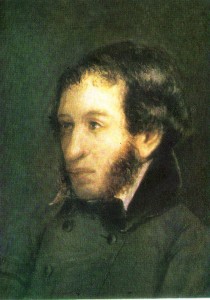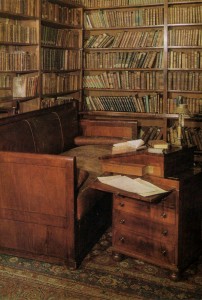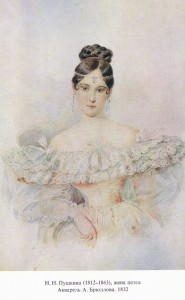A Conversation with Ivan Maximovich, a Connoisseur of Russian Literature and Culture.
 I.M. You said that the great Russian poets are the Ryabinins and what about Pushkin, our national pride, the verses of whom we were taught starting from the school bench.
I.M. You said that the great Russian poets are the Ryabinins and what about Pushkin, our national pride, the verses of whom we were taught starting from the school bench.
V.N. Do you know what? Definitely, Alexander Sergeyevich Pushkin (1799-1837) was a great scholastic Russian writer and poet, look at his library in the study from his last apartment to the address: 12 Moika Embankment, St. Petersburg, since February 10, 1925 it was officially opened The Pushkin Memorial Museum where we are visiting right now.
I.M. Yes, Pushkin’s library contained about 4,500 volumes. He would remark to his friends: “Books will be the ruin of me, I am spending as much on them as a glazier on diamonds.” 
V.N. At that time it was a remarkable hobby. It itself speaks the volumes. Nowadays I saw a portrait of a scholar and politician Michael Ignatieff sitting with his lap top, that is where all his information is. That is changing also the life style.
I.M. Looking at the personal belongings of the Pushkins as well as the modern furniture of those days which he bought at the workshop of brothers Gambs, Petersburg’s best cabinet-makers, between 1832 and 1835, the 11 rooms here which he was renting, it was the Pushkins’ sixth apartment during his marriage to Natalia  Nikolaevna Goncharova (1812-1863) for 6 years and they had 4 children.
Nikolaevna Goncharova (1812-1863) for 6 years and they had 4 children.
V.N. What life style did they lead? “Alexander Sergeyevich had the happiest of disposition for the married life,” related S. Goncharov, the brother of Pushkin’s wife. “But one thing could put him out considerably. He would not tolerate anyone entering his study while he was working,” “His great moral strength,” wrote P. Viazemsky,”lay in his indefatigable industry. He had an irresistible need to express in creative writing the images, sensations and feelings that arose within him. Work for Pushkin was a sacred thing, a font where his sores were healed and strength restored. When he settled down to work, he became tranquil, more mature, altogether a changed man.”
I.M. There was Pushkin’s letter to Natalia Nikolaevna, full of weariness and concern: “I am constantly uneasy and am not writing anything. And time is passing …What do I think about? It is this: what are we going to live on? God sees that I can’t write books for money…It will not be too bad if I live another 25 years, but if I should die within the next ten years, I really can’t think how you will manage… And what is Mashka going to say, and particularly Sashka? It will be of little comfort to them to know that their dear father died as a court jester, or that their mother looked divine at the Anichkov balls.” (Pushkin meant the balls at Nickolas I’s Anichkov Palace which only persons forming the sovereign’s retinue were allowed to attend. In 1834 the Tsar conferred upon Pushkin the humiliating rank of Junior Gentleman of the Bedchamber, so that his wife, one of the most beautiful women in Petersburg society, could dance at these balls.)
V.N. All the rest everybody knows. He died in duel to face death for a chance of revenge.
I visited many Pushkin’s memorial museums;: the Mikhailovskoye Estate, in Kishinev, Odessa, in the village of Boldino, in Moscow where he was born, in Tsarskoye selo (Pushkin) where he studied. In Kishinev I recollected his lovers’ list written by his own hand including 137 ladies. He loved women very much and for one he died.
The Ryabinins were peasants by roots, Pushkin tried to belong to the high society. These are but a little bit big differences. They are surely a great Russian national pride. And I love her by Beatles (first version)